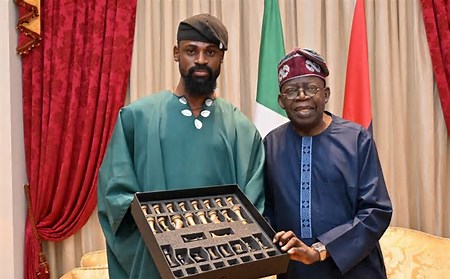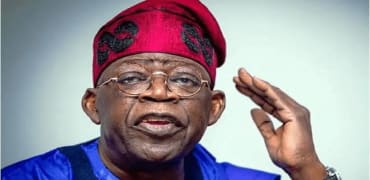Tinubu Lauds Tunde Onakoya’s Chess Feat, Pledges Government Support During Lagos Meeting
Tinubu Lauds Tunde Onakoya’s Chess Feat, Pledges Government Support During Lagos Meeting
By Achimi muktar
It was a meeting that captured the nation’s imagination — a young man who turned the game of kings into a lifeline for the underserved, face-to-face with Nigeria’s commander-in-chief.
President Bola Ahmed Tinubu on Monday hailed Tunde Onakoya, the visionary founder of Chess in Slums Africa, calling his work “a reflection of the resilience and brilliance of Nigeria’s youth.”
Onakoya, fresh off a stunning feat — breaking the Guinness World Record for the longest chess marathon — paid a visit to President Tinubu at his Lagos residence. Clutching his official Guinness certificate, Onakoya shared the inspiring story of his journey from the streets of Lagos to becoming a global ambassador for educational empowerment through chess.
“Through chess, he opens minds and transforms lives in communities that are too often overlooked,” Tinubu remarked during the meeting.
A Grassroots Movement Meets Presidential Support
Since founding Chess in Slums Africa, Onakoya has used the ancient game to spark curiosity, discipline, and hope in children from Nigeria’s most disadvantaged communities — many of whom had little or no access to formal education.
The project has touched hundreds of lives, attracting international media attention and admiration from education advocates worldwide.
President Tinubu expressed deep admiration for the initiative and made it clear that he sees Chess in Slums as a model that deserves national backing.
“Nigeria is proud of him, and we will walk with him,” the President said, adding that he hopes to explore ways to scale up the program nationwide.
Tinubu pledged to hold further discussions with Onakoya in Abuja to discuss potential government partnerships and expanded support.
Chess as a Weapon Against Poverty
Onakoya’s work is a powerful demonstration of how non-traditional tools — in this case, a game of strategy and intellect — can become powerful engines for social change.
In communities where formal education often stalls due to poverty or neglect, chess has offered an alternative pathway — teaching children critical thinking, patience, and self-belief.
From slum classrooms to international chess boards, Onakoya’s story resonates deeply in a country where youth unemployment and education gaps remain pressing challenges.
As word of the presidential visit spread across social media, many Nigerians celebrated the moment as a hopeful sign that innovative grassroots efforts can find support at the highest levels of government.
Whether a national chess-in-education movement will emerge from this meeting remains to be seen. But one thing is certain: Tunde Onakoya’s journey from the slums to a seat with the President has already made history.


















